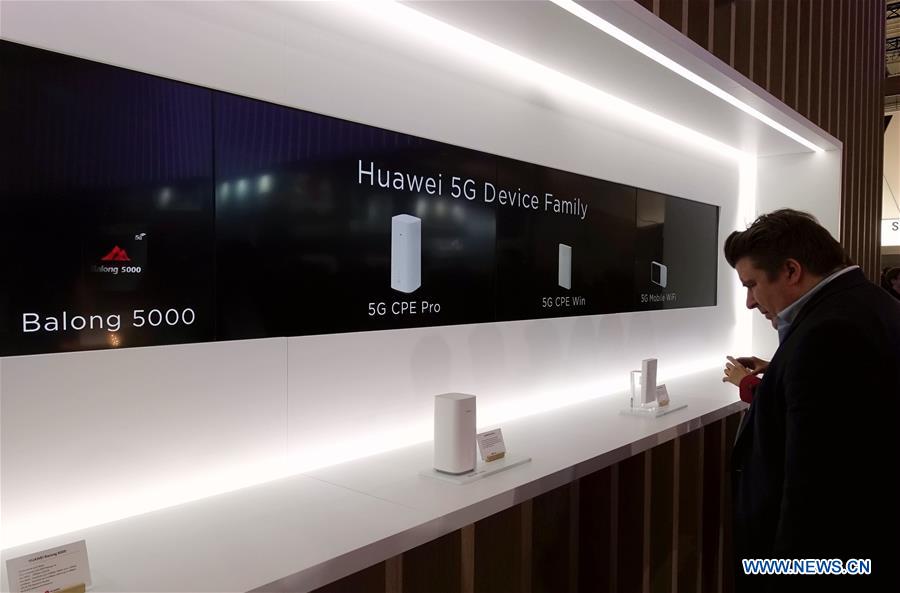
China's Huawei presents 5G devices at Mobile World Congress (MWC 2019) in Barcelona, Spain, Feb. 26, 2019. The four-day MWC 2019 presents the newest 5G products of the high-tech giants from around the world. (Xinhua/Guo Qiuda)
BARCELONA, March 1 (Xinhua) -- From automated cars to remote surgeries, futuristic scenarios have been pictured here in the 2019 Mobile World Congress (MWC) where 5G technology is in the spotlight.
To make changes happen, digital infrastructure, namely 5G network construction in the next phase, is essential to enable a super fast Internet that connects everything from everywhere.
In the construction process, fair competition as well as robust cooperation among mobile operators worldwide are critical to making the vision into reality, experts said.
COMPETITION DRIVES INNOVATION
By 2025, mobile operators are expected to invest between 300 billion and 500 billion euros (341.67 billion and 569.46 billion U.S. dollars) on the rollout of 5G across Europe, and as an industry will create over 4 percent of the entire economic output, according to GSMA, an organization representing over 750 operators and generating the MWC.
"Actions that disrupt the equipment supply for the various segments of the network (access, transport and core) will increase costs to European operators, businesses and citizens; delay 5G deployment by years across Europe," said GSMA in a statement shortly before the MWC.
In essence, GSMA is calling for more, not fewer, industry players to be allowed in the bidding process and help build infrastructure.
"Competition amongst equipment vendors has been a major driver of innovation; limiting or stalling the deployment of 5G or requiring changes to existing 4G infrastructure, risks leaving European consumers and businesses behind; and investment and innovation will move to those countries where 5G is happening first and fastest, impacting jobs and growth," it said.
China's Huawei, Sweden's Ericsson and Finland's Nokia are the three biggest suppliers of telecommunications equipment, while China's ZTE and South Korea's Samsung have smaller market share, according to research firm Dell'Oro Group.
"If we concentrate it down to two players, I think that's an unhealthy position not just for us as an industry but also for national infrastructure in the country," said Nick Read, CEO of Vodafone, one of the world's largest mobile operators.
NO EVIDENCE OF WRONGDOING
Discussions on inclusive competition are highlighted here because of the recent U.S. attempts to drive Huawei, a leading privately held company in 5G network construction, out of the market, despite the lack of evidence of Huawei's alleged wrongdoing to its customers.
"Like everyone else in the industry, I'm monitoring the findings of those investigations. Many service providers have told me several times they have never found anything wrong," Stephane Teral, executive director of research and analysis and an advisor for Mobile Infrastructure and Carrier Economics at IHS Markit, told Xinhua while attending the MWC.
Earlier this month, Robert Hannigan, former head of Britain's Government Communications Headquarters, wrote in the Financial Times that "assertions that any Chinese technology in any part of a 5G network represents an unacceptable risk are nonsense."
On Feb. 20, Ciaran Martin, head of Britain's National Cyber Security Center, said in Brussels that oversight of Huawei is functioning and even problems identified with Huawei do not indicate any hostility.
"As we said then, and repeat today, these problems are about standard of cyber security; they are not indicators of hostile activity by China," Martin said.
"The apparent decision by the UK to proceed with Huawei, if confirmed, is a very, very big deal," Jeffrey D. Sachs, a world-renowned economist at Columbia University, told Xinhua.
"It would have an enormous effect around the world in pushing back against the U.S. attempt to isolate Huawei," Sachs said.
COOPERATION BENEFICIAL
Back in China, Ericsson and Nokia, Huawei's two largest foreign competitors, have maintained cooperation with Chinese companies.
On Tuesday, Ericsson announced a 5G smart harbor at the Port of Qingdao with China Unicom, one of China's major mobile operator. The company is particularly strong in mobile communications in China, with nearly half the market for mobile systems.
In November 2018, Nokia announced three separate frame agreements worth a combined value of more than 2 billion euros (2.28 billion dollars) with China Mobile, China Telecom and China Unicom, all state-owned companies.
A multi-partner presence is also a valued approach for the city of Moscow, Andrey Belozerov, a senior advisor to the Chief Information Officer of Moscow City Government, told Xinhua.
"We work with different companies, including Huawei. We do not have any fear in relation to one company or another. When selecting partners, we evaluate quality and reliability of the products they produce and services they provide," Belozerov said.
"We believe that international cooperation in the sphere of developing new expensive technologies is necessary and extremely beneficial," he said.



